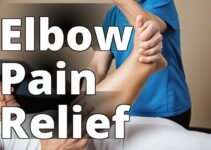What You'll Learn About Pain Management for Muscle Pain
- Causes, symptoms, and effects of muscle pain
- Conventional and alternative treatment options
- Lifestyle modifications and preventive measures
Are you looking for comprehensive information on pain management for muscle pain? Muscle pain, also known as myalgia, can significantly impact an individual's quality of life. Whether it stems from overexertion during physical activity, an injury, or an underlying medical condition, effective pain management is essential for alleviating discomfort and promoting recovery. This comprehensive guide aims to provide a detailed understanding of muscle pain, its causes, symptoms, diagnosis, treatment options, preventive measures, and holistic approaches to managing and preventing muscle pain.
Understanding Muscle Pain
Muscle pain, also known as myalgia, can arise from various sources and manifest in different forms, ranging from mild discomfort to severe, debilitating pain. Understanding the root causes and symptoms of muscle pain is crucial for implementing targeted treatment strategies.
Causes of Muscle Pain
Muscle pain can be attributed to several factors, including:
1. Overexertion and Physical Activity
Participating in rigorous physical activities or overexerting muscles during exercise can lead to muscle fatigue and subsequent pain.
2. Muscle Strain or Injury
Acute injuries or strains from sudden movements, lifting heavy objects, or engaging in strenuous activities can result in muscle pain.
3. Medical Conditions (e.g., Fibromyalgia, Myofascial Pain Syndrome)
Chronic conditions like fibromyalgia or myofascial pain syndrome can cause persistent and widespread muscle pain.
4. Medication Side Effects
Certain medications may induce muscle pain as a side effect, necessitating a careful evaluation of drug interactions and adverse effects.
Symptoms and Effects of Muscle Pain
The symptoms of muscle pain may include:
1. Localized Pain
Pain may be localized to specific muscle groups or spread across a larger area, depending on the underlying cause.
2. Muscle Stiffness
Stiffness and reduced flexibility in affected muscles are common symptoms associated with muscle pain.
3. Swelling and Inflammation
Inflammation and swelling may accompany muscle pain, contributing to discomfort and reduced mobility.
4. Impact on Daily Activities and Quality of Life
Severe muscle pain can impede daily activities, affecting an individual's overall well-being and productivity.
Diagnosis and Medical Evaluation
Seeking professional medical evaluation is crucial for accurately diagnosing the root cause of muscle pain and formulating an effective treatment plan. A comprehensive assessment typically involves:
Importance of Seeking Medical Advice for Muscle Pain
Consulting a healthcare professional is essential, especially when experiencing persistent or severe muscle pain, to rule out underlying health issues and receive appropriate guidance.
Physical Examination and Diagnostic Tests
Physical examinations and diagnostic tests, such as imaging studies and blood work, aid in identifying the source and extent of muscle pain.
Medical History and Pain Assessment
A detailed medical history and pain assessment help healthcare providers understand the onset, duration, and characteristics of muscle pain, facilitating a tailored approach to management.
By proactively seeking medical evaluation, individuals can address muscle pain in a targeted manner, promoting effective treatment outcomes and long-term relief.
Conventional Treatment Options for Muscle Pain
Medication for Pain Management
Medications play a key role in alleviating muscle pain and discomfort. Commonly utilized options include:
1. Over-the-Counter Pain Relievers (e.g., NSAIDs)
Nonsteroidal anti-inflammatory drugs (NSAIDs) are effective in reducing inflammation and relieving mild to moderate muscle pain.
2. Prescription Medications for Muscle Pain
In cases of severe or chronic muscle pain, healthcare providers may prescribe muscle relaxants or other prescription medications to manage symptoms.
Physical Therapy and Rehabilitation
Physical therapy programs tailored to the individual's needs can improve muscle strength, flexibility, and overall function, contributing to pain relief and prevention of future injuries.
Massage Therapy and Myofascial Release Techniques
Massage therapy and myofascial release techniques target muscle tension and trigger points, promoting relaxation and alleviating pain.
Chiropractic Care for Pain Relief
Chiropractic manipulation and adjustments may offer relief from muscle pain and enhance musculoskeletal function.
Acupuncture for Muscle Pain Management
Acupuncture, an alternative therapy, has shown promise in managing muscle pain by promoting natural pain relief and reducing inflammation.
The integration of conventional treatment modalities provides a comprehensive approach to managing muscle pain, addressing symptoms, and promoting recovery.
Lifestyle Modifications for Pain Management
Benefits of Regular Exercise and Physical Activity
Engaging in appropriate and supervised exercise routines can strengthen muscles, improve flexibility, and contribute to overall pain management.
Importance of Nutrition for Muscle Health
A well-balanced diet rich in essential nutrients supports muscle health and aids in the prevention of nutritional deficiencies that can contribute to muscle pain.
Hydration and Its Role in Pain Relief
Proper hydration is vital for muscle function and recovery, playing a key role in reducing the risk of cramps and muscle soreness.
Rest and Recovery Strategies for Muscle Pain
Incorporating adequate rest periods and recovery strategies is essential for allowing muscles to heal and regenerate, contributing to pain management and injury prevention.
By embracing lifestyle modifications, individuals can actively participate in their pain management journey, fostering overall well-being and resilience against muscle pain.
Home Remedies and Self-Care Practices for Muscle Pain
The integration of home remedies and self-care practices complements traditional treatment approaches, offering natural and accessible avenues for pain relief and management.
Hot and Cold Therapy for Pain Relief
Alternating between hot and cold compresses can help alleviate muscle pain, reduce inflammation, and promote relaxation in affected areas.
Stress Reduction and Relaxation Techniques
Practicing stress-reducing techniques, such as meditation and deep breathing exercises, can aid in managing muscle tension and discomfort.
Stretching and Strengthening Exercises for Pain Management
Incorporating targeted stretching and strengthening exercises can improve muscle flexibility and function, contributing to pain relief and injury prevention.
Ergonomics and Posture Improvement
Maintaining proper ergonomics and posture in daily activities and work environments can mitigate muscle strain and reduce the risk of pain-related issues.
The proactive adoption of home remedies and self-care practices empowers individuals to actively engage in pain management and cultivate a supportive environment for muscle health.
Preventive Measures for Muscle Pain
Prevention plays a pivotal role in minimizing the occurrence and severity of muscle pain, emphasizing the importance of proactive measures and lifestyle adjustments.
Importance of Proper Ergonomics and Body Mechanics
Practicing proper ergonomics and body mechanics during physical activities and daily tasks can reduce the risk of muscle strain and injury.
Warm-up and Cool-down Routines for Physical Activities
Incorporating warm-up and cool-down routines before and after physical activities prepares muscles for exertion and aids in preventing muscle pain and injury.
Role of Physical Fitness in Preventing Muscle Pain
Maintaining overall physical fitness through regular exercise and conditioning contributes to muscle strength and resilience, lessening the susceptibility to muscle pain.
By prioritizing preventive measures, individuals can proactively safeguard against the onset of muscle pain and optimize their musculoskeletal well-being.
Seeking Professional Help and Specialist Care
In instances of severe or persistent muscle pain, seeking professional help and specialized care is paramount for comprehensive evaluation and targeted intervention.
Consultation with Healthcare Professionals for Severe Muscle Pain
Consulting healthcare professionals, such as primary care physicians or specialists, ensures thorough evaluation and personalized guidance for managing severe muscle pain.
Customized Treatment Plans and Pain Management Strategies
Tailored treatment plans, designed in collaboration with healthcare providers, address the unique needs and concerns of individuals experiencing persistent muscle pain.
Referral to Pain Management Specialists and Musculoskeletal Experts
Referral to pain management specialists and musculoskeletal experts may offer advanced treatment options and multidisciplinary approaches for complex cases of muscle pain.
By seeking professional assistance and specialist care, individuals can access targeted interventions and expert guidance, fostering optimal outcomes in their pain management journey.
Alternative and Complementary Therapies
Incorporating alternative and complementary therapies alongside conventional approaches presents diverse avenues for holistic pain management and overall well-being.
Yoga and Its Role in Pain Management
Yoga, with its focus on controlled movements and mindfulness, offers benefits for managing muscle pain, improving flexibility, and reducing stress.
Tai Chi for Muscle Pain Relief and Flexibility
The gentle, flowing movements of Tai Chi can aid in relieving muscle tension, enhancing balance, and promoting flexibility, contributing to pain relief and management.
Mindfulness-Based Practices for Pain Coping Strategies
Practicing mindfulness through meditation and mindful living cultivates resilience and equips individuals with effective coping strategies for managing muscle pain.
The integration of alternative and complementary therapies enriches pain management approaches, providing individuals with diverse tools for addressing muscle pain and fostering overall well-being.
Managing Chronic Muscle Pain
Chronic muscle pain presents unique challenges that necessitate long-term management strategies and comprehensive support for individuals navigating persistent discomfort.
Challenges of Long-Term Muscle Pain and Impact on Daily Life
The enduring nature of chronic muscle pain can significantly impact an individual's physical, emotional, and social well-being, requiring multifaceted management approaches.
Coping Strategies and Support for Those with Chronic Muscle Pain
Implementing coping strategies, such as social support networks and stress management techniques, offers invaluable support for individuals managing chronic muscle pain.
Ongoing Treatment and Pain Management Options
Continuous access to tailored treatment and pain management options is essential for enhancing quality of life and promoting resilience in individuals with chronic muscle pain.
By addressing the unique challenges associated with chronic muscle pain, individuals can access the necessary support and resources for effectively managing long-term discomfort.
Addressing Mental Health in Muscle Pain Management
Recognizing the interconnectedness of mental and physical well-being is paramount in addressing the holistic aspects of muscle pain and promoting comprehensive care.
Connection between Mental Well-being and Physical Pain
The intricate relationship between mental well-being and physical pain underscores the importance of addressing emotional and psychological aspects in pain management.
Strategies for Managing Stress, Anxiety, and Depression in Pain Management
Implementing strategies to manage stress, anxiety, and depression is essential for promoting emotional well-being and mitigating the impact of muscle pain.
Psychological Techniques for Coping with Muscle Pain
Psychotherapeutic interventions and cognitive-behavioral techniques offer valuable tools for individuals to cope with and manage the psychological impact of muscle pain.
By integrating mental health support into pain management strategies, individuals can cultivate resilience and address the holistic dimensions of muscle pain.
Patient Education and Empowerment
Empowering individuals with comprehensive knowledge and self-care strategies fosters active participation in pain management and enhances overall well-being.
Understanding the Causes and Triggers of Muscle Pain
Educating individuals about the causes and triggers of muscle pain enables informed decision-making and proactive engagement in pain management.
Self-Care Strategies and Pain Management Techniques
Equipping individuals with self-care strategies and pain management techniques fosters self-efficacy and autonomy in addressing muscle pain.
Importance of Patient Education in Pain Management and Empowerment
Patient education serves as a cornerstone in promoting proactive engagement and informed decision-making, leading to enhanced overall well-being.
Real-Life Pain Management Journey: Overcoming Chronic Muscle Pain
A Turning Point
Growing up as an athlete, Sarah was no stranger to muscle pain. However, after a car accident left her with chronic muscle pain, her life took an unexpected turn. Simple tasks became a challenge, and the constant discomfort took a toll on her mental well-being.
Seeking Professional Help
After struggling for months, Sarah decided to seek medical advice. Her doctor conducted a thorough physical examination and recommended a combination of physical therapy and prescribed medications for pain management.
Embracing Holistic Approaches
Despite the initial skepticism, Sarah incorporated lifestyle modifications such as regular exercise, proper nutrition, and hydration into her routine. She also explored alternative therapies like yoga and mindfulness-based practices, which played a significant role in her pain coping strategies.
The Road to Empowerment
Through patient education and empowerment, Sarah gradually learned to understand her triggers and manage her pain effectively. Over time, she developed a personalized treatment plan in collaboration with her healthcare team, allowing her to lead a fulfilling life despite the persistent muscle pain.
This real-life journey underscores the importance of a comprehensive approach to pain management, combining medical intervention, lifestyle adjustments, and holistic therapies to overcome chronic muscle pain.
Conclusion
In conclusion, the effective management of muscle pain encompasses a multifaceted approach, integrating conventional treatments, lifestyle modifications, preventive measures, and holistic strategies. By seeking professional guidance, embracing self-care practices, and addressing mental health aspects, individuals can navigate the challenges of muscle pain with resilience and empowerment. Empowered by knowledge and comprehensive support, individuals can embark on a proactive journey toward pain management and enhanced well-being.
In your pursuit of reliable and well-researched information, it's crucial to explore reputable sources. For further insight into alternative and complementary therapies, as well as the benefits of CBD in pain management, consider referring to CBD Health Benefits and Cannabidiol for Muscle Recovery.
Remember, proactive engagement, informed decision-making, and access to supportive resources are instrumental in your journey toward effective muscle pain management and overall well-being.
Common Questions
Q. Who can benefit from pain management for muscle pain?
A. Anyone experiencing muscle pain can benefit from pain management techniques.
Q. What are some effective pain management strategies for muscle pain?
A. Strategies include stretching, hot/cold therapy, massage, and over-the-counter pain relievers.
Q. How can stretching help with muscle pain management?
A. Stretching can improve flexibility, reduce muscle tension, and alleviate pain.
Q. What if over-the-counter pain relievers don't work for muscle pain?
A. Consult a healthcare professional for personalized pain management recommendations.
Q. How does hot/cold therapy help manage muscle pain?
A. Heat increases blood flow, while cold reduces inflammation, both aiding in pain relief.
Q. What if I'm unsure which pain management technique is best for me?
A. Consult a healthcare professional to discuss personalized pain management options.
With over 15 years of experience as a licensed physical therapist and a Doctorate in Physical Therapy (DPT), Ethan Johnson is an expert in pain management and rehabilitation. Ethan Johnson has worked in various clinical settings, specializing in musculoskeletal disorders and chronic pain management. Their expertise is grounded in evidence-based practice, and they have conducted research on the effectiveness of physical therapy modalities for muscle pain relief, with their work published in reputable journals such as the Journal of Orthopaedic & Sports Physical Therapy and the Journal of Manual & Manipulative Therapy. Additionally, Ethan Johnson has presented at national conferences on the role of exercise and complementary therapies in managing muscle pain. Their dedication to patient education and empowerment has also led them to develop comprehensive pain management programs for individuals with chronic muscle pain, integrating holistic approaches for long-term relief. Currently, Ethan Johnson continues to practice in a leading rehabilitation center while also serving as a clinical instructor for physical therapy students, further advancing the field of pain management.




